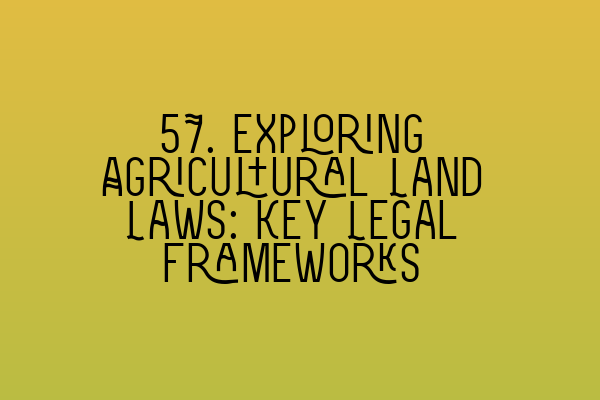57. Exploring Agricultural Land Laws: Key Legal Frameworks
Welcome to SQE Property Law & Land Law’s blog post series. In this edition, we will explore the key legal frameworks surrounding agricultural land laws. If you are preparing for the SQE 1 exam, make sure to check out our SQE 1 Practice Exam Questions and SQE 1 Practice Mocks FLK1 FLK2 for comprehensive preparation. For SQE 2 candidates, we offer SQE 2 Preparation Courses. Let’s dive into the world of agricultural land laws!
Understanding Agricultural Land Laws
Agricultural land laws play a vital role in regulating the use, ownership, and management of agricultural properties. These laws aim to protect agricultural land, promote sustainable farming practices, and ensure the well-being of rural communities.
It is crucial for property law professionals to have a solid understanding of the legal frameworks surrounding agricultural land. This knowledge enables them to provide expert advice to clients involved in agricultural land transactions, disputes, and regulatory compliance.
Key Legal Frameworks
There are several key legal frameworks that govern agricultural land laws in the UK. Let’s explore these frameworks in detail:
1. Agricultural Holdings Act 1986
The Agricultural Holdings Act 1986 establishes the rights and responsibilities of landlords and agricultural tenants in England and Wales. It sets out the conditions for tenancies, including the requirements for rent, repairs, and termination.
For a comprehensive understanding of the Agricultural Holdings Act 1986, it is recommended to study this topic in-depth as part of your SQE 1 preparation. Our SQE 1 Preparation Courses cover the relevant legal provisions in detail.
2. Agricultural Tenancies Act 1995
The Agricultural Tenancies Act 1995 introduced the concept of Farm Business Tenancies (FBTs), providing agricultural tenants with greater flexibility and security. FBTs allow tenants to negotiate terms directly with landlords, providing more opportunities for tenant farmers.
Gaining a thorough understanding of the Agricultural Tenancies Act 1995 is essential for property law practitioners working with agricultural clients. Make sure to include this topic in your SQE 1 exam preparation.
3. Common Agricultural Policy (CAP)
The Common Agricultural Policy (CAP) is an EU agricultural policy that plays a significant role in the UK’s agricultural sector. It provides financial support to farmers and establishes regulations on land use, farming practices, and environmental protection.
With Brexit, the UK’s agricultural policy is undergoing significant changes. Stay updated with the latest developments in agricultural land laws and policies to provide accurate advice to clients.
4. Environmental Stewardship Schemes
Environmental Stewardship Schemes are government initiatives aimed at incentivizing farmers to adopt environmentally friendly farming practices. These schemes provide financial support to farmers who undertake specific conservation and biodiversity measures on their agricultural land.
Awareness of the various Environmental Stewardship Schemes and their implications is crucial for property law professionals advising clients on land management and compliance matters.
Conclusion
As a property law professional, acquiring a comprehensive understanding of agricultural land laws is essential to provide expert advice to clients involved in agricultural land transactions and disputes. Familiarize yourself with the key legal frameworks, such as the Agricultural Holdings Act 1986, Agricultural Tenancies Act 1995, Common Agricultural Policy, and Environmental Stewardship Schemes.
For those preparing for the SQE exams, check out our SRA SQE Exam Dates and other preparation resources mentioned earlier. Stay tuned for more insightful blog posts from SQE Property Law & Land Law. Happy learning!
